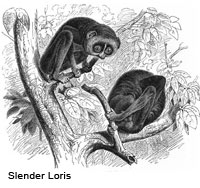|

Slow Loris
Adult slow lorises range in size from 21 to 38 cm, depending on the species, and weigh up to 2 kilograms. The tail is a mere stump. The short, thick fur can have a variety of color, mostly grey-reddish and often with whitish undertones. They have well developed thumbs, which they use to grasp and hold fast to branches, and a very flexible back. The eyes are large and point forward, and the ears are small and nearly hidden in the fur. They are generally more strongly built than the slender lorises.
Strong fingers and toes: All lorises have strong finger and toes with powerful grip that can hold on for extremely long amounts of time.

Solo night tree dwellers: They live in trees (arboreal) and are nocturnal. The loris is a solitary being, and territorial.
Sweet little balls of sleep: They usually sleep tucked into a ball, arms over their heads during the day in tree crevices, on branches or in hollowed areas of trees.
Slow movers: They move slowly and use very deliberate hand over hand motions. They can walk underneath a branch as well as they can from above, and though generally very slow moving, they can move quickly if on alert - but they do not leap or jump.

Treetop dwellers: Like all lorises, slow lorises are nocturnal and arboreal animals that prefer the tops of the trees. Also, they have slow, deliberate movements and a powerful grasp that makes them very difficult to remove from branches. They live as solitaries or in small family groups, and mark their territory with urine.
Small but toxic: Slow lorises can produce a toxin which they mix with their saliva and use as protection against enemies. Mothers will lick this toxin onto her offspring before leaving them to search for food.
Lightning-quick snatch: Slow lorises are happenstance carnivores, typically eating insects, bird eggs and small vertebrates. With their slow quiet movements, they creep to their prey, in order to then catch it with a lightning-quick snatch. They also eat fruits, but rarely.

After an approximately 190-day gestation, the female births one (or rarely two) young. The newborn clasps itself to the belly of the mother or the father. When it is older it will be "parked" on a branch while its parent searches for food. After approximately nine months they are weaned. The life expectancy of the slow loris is up to 14 years.
 These slow moving strepsirrhine primates (slow lorises) range from Borneo and the southern Philippines in Southeast Asia, through Bangladesh, Vietnam, Southern China (Yunnan area) and Thailand. The slender loris lives in Southern India and Sri Lanka. These areas tend to be tropical forests, woodlands, and swampy forests. These slow moving strepsirrhine primates (slow lorises) range from Borneo and the southern Philippines in Southeast Asia, through Bangladesh, Vietnam, Southern China (Yunnan area) and Thailand. The slender loris lives in Southern India and Sri Lanka. These areas tend to be tropical forests, woodlands, and swampy forests.

- Family Lorisidae
- Subfamily Perodicticinae
- Subfamily Lorinae
- Genus Loris
- Red Slender Loris, Loris tardigradus
- Gray Slender Loris, Loris lydekkerianus
- Mysore Slender Loris, Loris lydekkerianus lydekkerianus
- Malabar Slender Loris, Loris lydekkerianus malabaricus
- Highland Slender Loris, Loris lydekkerianus grandis
- Loris lydekkerianus nycticeboides
- Genus Nycticebus
- Sunda Loris, Nycticebus coucang
- Bengal Slow Loris, Nycticebus bengalensis
- Pygmy Slow Loris, Nycticebus pygmaeus
All text is available under the terms
of the GNU Free Documentation License
|